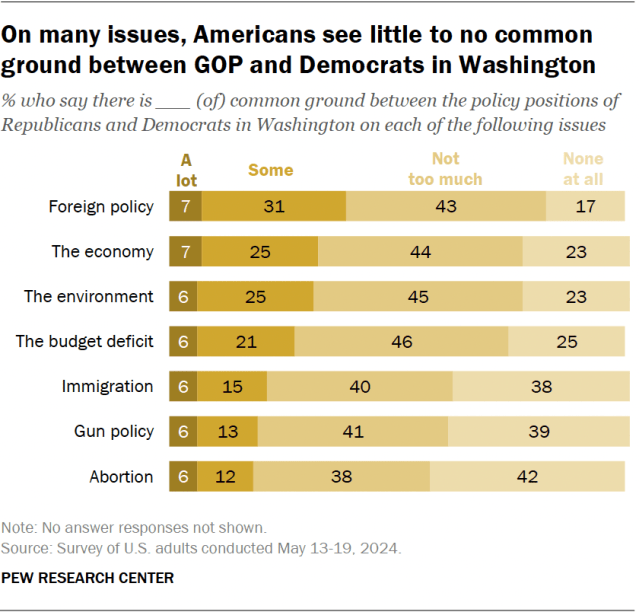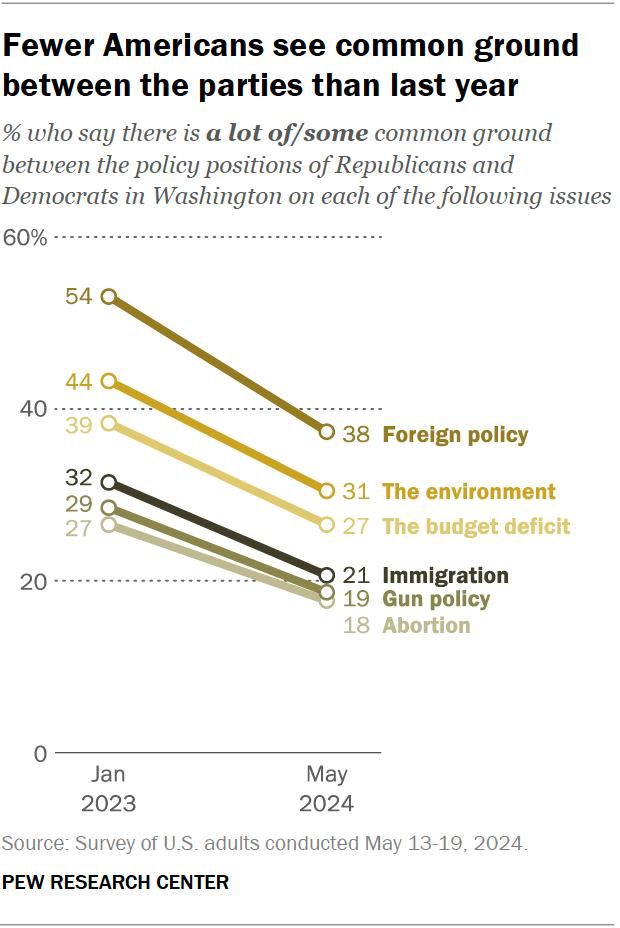On a wide range of issues, fewer than half of Americans say there is common ground between Republicans and Democrats in Washington.
But there are some differences over where the parties do agree. The public continues to see more bipartisan common ground on foreign policy than on topics such as abortion and gun policy, according to a Pew Research Center survey conducted May 13-19, 2024, among 8,638 U.S. adults.
Pew Research Center conducted this analysis to understand how Americans view the policy positions of Republicans and Democrats in Washington. For this analysis, we surveyed 8,638 U.S. adults from May 13 to 19, 2024.
Everyone who took part in this survey is a member of the Center’s American Trends Panel (ATP), an online survey panel that is recruited through national, random sampling of residential addresses. This way nearly all U.S. adults have a chance of selection. The survey is weighted to be representative of the U.S. adult population by gender, race, ethnicity, partisan affiliation, education and other categories. Read more about the ATP’s methodology.
Here are the questions used for this analysis, along with responses, and its methodology.

- About four-in-ten Americans (38%) say there is at least some common ground between the two parties’ foreign policy positions.
- By contrast, just 18% of Americans say there is at least some common ground between Republicans and Democrats on abortion. Most (80%) say there is either not too much overlap on this issue (38%) or no common ground at all (42%).
- Only about two-in-ten say there is some or a lot of bipartisan common ground on the issues of gun policy (19%) or immigration (21%).
- Larger shares – though still minorities of the public – see at least some common ground on the budget deficit (27%), the environment (31%) or the economy (32%).
Americans see less common ground than they did last year

Compared with January 2023, Americans now see less common ground between the two parties in Washington on all six issues asked about in both surveys. (The 2023 survey did not ask about the economy.)
- For example, last year, 54% saw at least some common ground on foreign policy. Today, 38% do, a 16 percentage point drop.
Across these six issue areas, the share of adults who say there is at least some common ground between the parties has declined by an average of 12 points since 2023.
Views of Republicans and Democrats

Partisan differences are generally modest when it comes to Americans’ perceptions of common ground between the parties. However, when there are differences, Democrats are more likely than Republicans to say there is bipartisan common ground.
Democrats and Democratic-leaning independents are nearly twice as likely as Republicans and Republican leaners to say there is at least some common ground between the parties in Washington on the economy (41% vs. 22%).
Democrats are also more likely than Republicans to perceive some common ground on foreign policy (44% vs. 32%) and immigration (27% vs. 15%).
And Democrats are somewhat more likely than Republicans to say there is some common ground on the budget deficit (31% vs. 22%) and gun policy (23% vs. 16%).
Note: This is an update of a post originally published on Feb. 15, 2023. Here are the questions used for this analysis, along with responses, and the survey methodology.
